Peugeot 408 VS Toyota Prius – Specs, Efficiency & Price Comparison
Which model is the better choice – the Peugeot 408 or the Toyota Prius? We compare performance (225 HP vs 223 HP), boot capacity (536 L vs 284 L), efficiency (15.10 kWh1.40 L vs 0.50 L), and of course, the price (34300 £ vs 39400 £).
Find out now which car fits your needs better!
The Peugeot 408 (SUV) is powered by a Plugin Hybrid, Electric or Petrol MHEV engine and comes with a Automatic transmission. In comparison, the Toyota Prius (Hatchback) features a Plugin Hybrid engine and a Automatic gearbox.
When it comes to boot capacity, the Peugeot 408 offers 536 L, while the Toyota Prius provides 284 L – depending on what matters most to you. If you’re looking for more power, you’ll need to decide whether the 225 HP of the Peugeot 408 or the 223 HP of the Toyota Prius suits your needs better.
There are also differences in efficiency: 15.10 kWh1.40 L vs 0.50 L. In terms of price, the Peugeot 408 starts at 34300 £, while the Toyota Prius is available from 39400 £.
Compare all the key specs now and find out which model fits your lifestyle best!
Peugeot 408
The Peugeot 408 captivates with its sleek and dynamic design, setting it apart in the competitive crossover market. Its interior offers a perfect blend of comfort and cutting-edge technology, creating an enjoyable driving experience. The model's efficient performance and modern features make it a compelling choice for those seeking both style and functionality in their vehicles.
details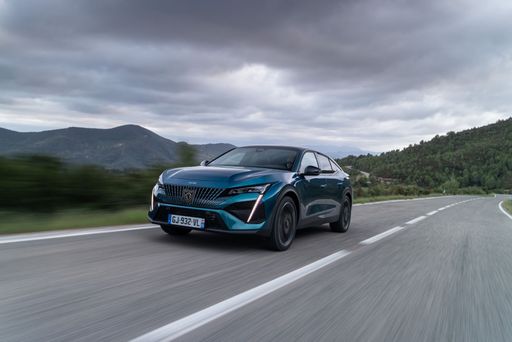 @ media.stellantis.com
@ media.stellantis.com
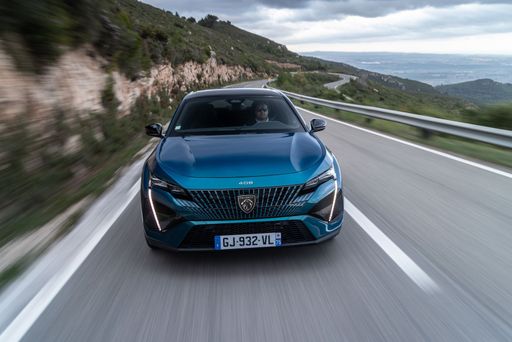 @ media.stellantis.com
@ media.stellantis.com
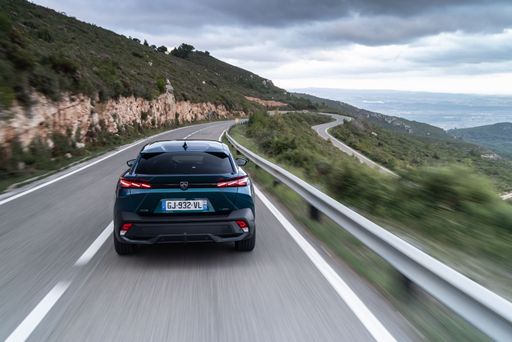 @ media.stellantis.com
@ media.stellantis.com
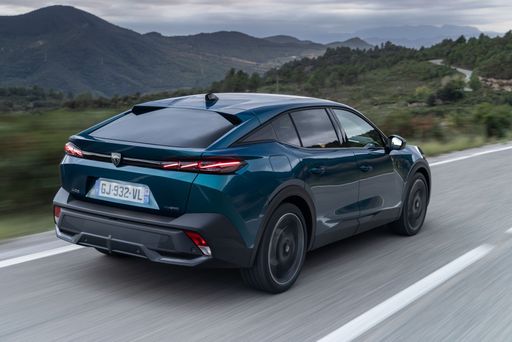 @ media.stellantis.com
@ media.stellantis.com
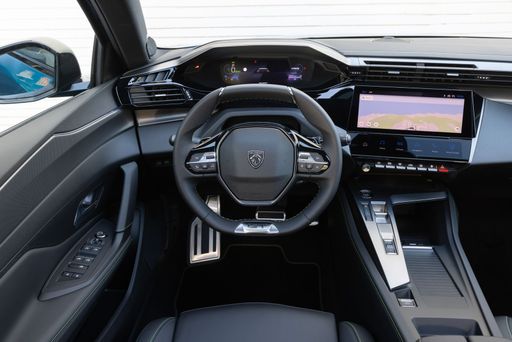 @ media.stellantis.com
@ media.stellantis.com
Toyota Prius
The Toyota Prius stands as a pioneer in the realm of hybrid vehicles, offering an eco-friendly driving alternative with its innovative technology. Its aerodynamic design and comfortable interior make it a practical choice for those looking to reduce their carbon footprint without sacrificing style. Additionally, the Prius boasts a reputation for reliability and efficiency, contributing to its lasting popularity among environmentally conscious drivers.
details @ Toyota
@ Toyota
 @ Toyota
@ Toyota
 @ Toyota
@ Toyota
 @ Toyota
@ Toyota

|

|
|
|
|
Costs and Consumption |
|
|---|---|
|
Price
34300 - 44400 £
|
Price
39400 - 45800 £
|
|
Consumption L/100km
1.4 - 5.1 L
|
Consumption L/100km
0.5 - 0.7 L
|
|
Consumption kWh/100km
15.10 kWh
|
Consumption kWh/100km
-
|
|
Electric Range
63 - 453 km
|
Electric Range
72 - 86 km
|
|
Battery Capacity
11.3 - 58.2 kWh
|
Battery Capacity
-
|
|
co2
0 - 114 g/km
|
co2
12 - 17 g/km
|
|
Fuel tank capacity
40 - 52 L
|
Fuel tank capacity
40 L
|
Dimensions and Body |
|
|---|---|
|
Body Type
SUV
|
Body Type
Hatchback
|
|
Seats
5
|
Seats
5
|
|
Doors
5
|
Doors
5
|
|
Curb weight
1544 - 1879 kg
|
Curb weight
1620 - 1630 kg
|
|
Trunk capacity
471 - 536 L
|
Trunk capacity
284 L
|
|
Length
4687 mm
|
Length
4599 mm
|
|
Width
1848 mm
|
Width
1782 mm
|
|
Height
1478 mm
|
Height
1470 mm
|
|
Payload
371 - 456 kg
|
Payload
365 - 375 kg
|
Engine and Performance |
|
|---|---|
|
Engine Type
Plugin Hybrid, Electric, Petrol MHEV
|
Engine Type
Plugin Hybrid
|
|
Transmission
Automatic
|
Transmission
Automatic
|
|
Transmission Detail
Automatikgetriebe, Automat. Schaltgetriebe (Doppelkupplung)
|
Transmission Detail
-
|
|
Drive Type
Front-Wheel Drive
|
Drive Type
Front-Wheel Drive
|
|
Power HP
145 - 225 HP
|
Power HP
223 HP
|
|
Acceleration 0-100km/h
7.2 - 9.4 s
|
Acceleration 0-100km/h
6.80 s
|
|
Max Speed
160 - 233 km/h
|
Max Speed
177 km/h
|
|
Torque
230 - 360 Nm
|
Torque
-
|
|
Number of Cylinders
4
|
Number of Cylinders
4
|
|
Power kW
107 - 165 kW
|
Power kW
164 kW
|
|
Engine capacity
1199 - 1598 cm3
|
Engine capacity
1998 cm3
|
General |
|
|---|---|
|
Model Year
2024 - 2025
|
Model Year
2023
|
|
CO2 Efficiency Class
B, A, C
|
CO2 Efficiency Class
B
|
|
Brand
Peugeot
|
Brand
Toyota
|
Peugeot 408
The New Lion on the Block: The Peugeot 408
As Peugeot continues to innovate within the SUV segment, the latest iteration of the Peugeot 408 sets new standards in technology, efficiency, and design. With its cutting-edge engineering and innovative features, the Peugeot 408 is more than just a stylish SUV—it's a marvel of modern automotive technology. This article dives into the technical details and innovations that make the Peugeot 408 a highly compelling choice for consumers in the market for a new vehicle.
A Glimpse into the Engine Bay: Performance and Efficiency
The Peugeot 408 comes with a diverse range of powertrains that blend performance and fuel efficiency. Featuring a selection of petrol mild-hybrid, petrol, and plug-in hybrid options, the 408 caters to a variety of driving preferences. The engines have a power output ranging from 131 to 225 PS, ensuring that there's a version suited to both city commutes and highway cruising.
Fuel economy is a significant focus, with consumption figures spanning from an impressive 1.5 L/100km for the plug-in hybrid models to a moderate 6.1 L/100km for the traditional petrol engines. Additionally, the plug-in hybrid versions boast an electric range of up to 55 kilometres, ideal for reducing emissions during shorter journeys.
Ultimate Comfort and Technology in the Cockpit
Peugeot excels in creating interiors that provide both comfort and cutting-edge technology. The 408 doesn't disappoint in this regard. It offers a spacious cabin, accommodating up to five passengers, with high-quality materials and ergonomic designs that enhance the driving experience.
The infotainment system in the Peugeot 408 is state-of-the-art, featuring a responsive touchscreen interface, premium sound options, and seamless connectivity with smartphones. Advanced driver-assistance systems such as adaptive cruise control, lane-keeping assist, and automated emergency braking ensure that journeys are not only comfortable but also safe.
Design Meets Function: Exterior and Practicality
In the realm of exterior design, Peugeot has delivered a striking silhouette with aerodynamic lines and a robust SUV stance. Measuring 4687 mm in length, 1848 mm in width, and 1478 mm in height, the 408 boasts a dynamic presence on the road without compromising on practicality.
Practicality is further enhanced by a generous boot space that ranges from 471 to 536 litres, depending on the model, making it perfect for family trips or weekend getaways. A high payload capacity and thoughtfully designed storage solutions ensure that the Peugeot 408 remains versatile, able to adapt to various lifestyle needs.
Environmental Responsibility and Sustainable Driving
With a keen eye on sustainability, the Peugeot 408 offers an impressive CO2 efficiency rating. The plug-in hybrid versions, in particular, present a substantial reduction in carbon emissions, operating at as low as 33 g/km. This makes the 408 a viable option for environmentally conscious consumers seeking to minimise their carbon footprint.
The automaker's commitment to sustainability does not end at emissions. The materials used in the 408's construction are carefully selected to promote durability and recyclability, ensuring that the vehicle maintains a lower impact on the environment throughout its lifecycle.
Conclusion: The Perfect Blend of Innovation and Tradition
The Peugeot 408 is a remarkable illustration of Peugeot's ability to blend traditional automotive values with the latest technological advancements. Its innovative powertrains, luxurious interiors, and forward-thinking design make it a formidable contender in the competitive SUV market. Whether you prioritise fuel economy, driving performance, or cutting-edge technology, the Peugeot 408 is poised to meet and exceed expectations. As Peugeot advances into the future, the 408 leads the charge as a testament to the brand's relentless pursuit of excellence.
Toyota Prius
The All-New Toyota Prius: Revolutionising Efficiency and Performance
The Toyota Prius, a name synonymous with hybrid innovation, has once again shown why it remains at the forefront of eco-friendly automotive technology. The latest models have enhanced technical features and innovations, setting new standards for efficiency and driving experience.
Hybrid Performance: A Leap Forward
The latest Prius models employ a sophisticated 2.0 litre Plug-in Hybrid system that flawlessly melds petrol and electric power. With a power output of 223 PS, it propels the Prius with impressive dynamism, reaching 0-100 km/h in just 6.8 seconds. This performance-oriented aspect of the Prius does not compromise on efficiency, with an astonishing fuel consumption ranging from 0.5 to 0.7 L/100km.
Electric Range and Efficiency
One of the key highlights of the new Prius is its substantial electric-only range. Depending on the variant, it can travel between 72 to 86 km on electric power alone, making it an ideal choice for urban commutes where zero emissions are preferred. The hybrid system's CO2 emissions are remarkably low, between 12 and 17 g/km, contributing to its CO2 Efficiency Class B rating.
Engineering Excellence with CVT
The Prius is equipped with a state-of-the-art Continuously Variable Transmission (CVT), ensuring a smooth and efficient drive. This advanced transmission supports the front-wheel-drive layout, delivering power seamlessly and enhancing driving pleasure without sacrificing fuel economy.
Stylish Design and Comfort
Designed as a sleek five-door hatchback, the Prius offers a comfortable and spacious interior with seating for five passengers. It measures 4599 mm in length, 1782 mm in width, and 1470 mm in height, offering a practical balance of size and comfort. The boot space, while tailored for the hybrid battery, still provides a decent 284 litres of storage.
Cost Efficiency
The running costs of the Prius are competitive, with monthly expenses estimated between €1064 and €1188, and cost per kilometre ranging from 42.6 to 47.5 cents. Its efficient design results in a maximum speed of 177 km/h and a practical fuel tank size of 40 litres, ensuring less frequent stops on longer journeys.
Conclusion: The Prius Legacy Continues
The Toyota Prius continues to lead by example in the realm of hybrid technology. Combining impressive power with unmatched efficiency and a sophisticated driving experience, it is clear that the Prius remains a compelling choice for the environmentally conscious driver. Its innovative features and favourable cost metrics only bolster its appeal in the modern automotive landscape.
The prices and data displayed are estimates based on German list prices and may vary by country. This information is not legally binding.
